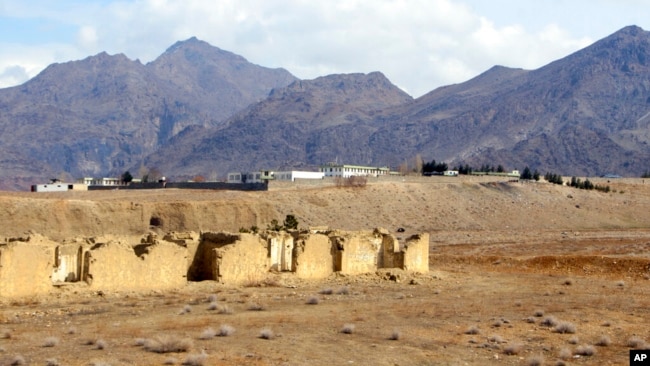Voice of America/VOA

The Taliban, facing international sanctions and a dire economic outlook at home, have intensified efforts to leverage Afghanistan’s vast natural resources.
From oil to copper, gold and lithium, the Islamist leadership, unrecognized by any nation as Afghanistan’s legitimate government, has inked multibillion-dollar mining deals with Chinese and other foreign companies.
The landlocked country has plunged deep into economic trouble since Western donors cut off all development assistance, amounting to several billion dollars annually, after the Taliban seized power in August 2021.
Donors have also slashed humanitarian funding for Afghanistan, prompting aid agencies to suspend critical funding for about 10 million Afghans facing acute food insecurity.
Taliban officials contend they are using domestic sources to try to bridge the chasm left by the withdrawal of foreign aid. Critics, however, contend that the Taliban have other intentions.
“What the Taliban see in these contracts is both cash and a diplomatic link to the Chinese government,” said Arian Sharifi, a lecturer at Princeton University’s School of Public and International Affairs.
Afghanistan’s untapped mineral wealth, estimated to be worth trillions of dollars, has historically struggled to attract foreign investment because of security concerns and a lack of infrastructure.
Work under a $3 billion contract signed in 2007 between China Metallurgical Group Corp. and the Afghan government for copper mining has yet to commence, despite a 25-year time frame.
This past January, another Chinese company, Xinjiang Central Asia Petroleum and Gas Company, pledged a $540 million investment until 2026 for oil extraction in northern Afghanistan.
Evading sanctions?
For over three decades, numerous Taliban leaders have remained on the United Nations’ terrorism sanctions list, barring them from foreign business and travel.
Several Western countries, including the United States, Canada and various European nations, have also imposed economic, banking and political sanctions on Taliban individuals and entities.
Spokespersons at the U.S. State and Treasury departments did not answer questions on whether the Taliban’s mining contracts with Chinese companies violated the existing sanctions regime.
“U.S. sanctions generally require U.S. persons and some foreign persons to comply,” said Alex Zerden, a fellow at the Center for a New American Security.
“A foreign company could be violating U.S. sanctions if the company engages in a transaction or dealing with a designated person and the transaction or dealing has a nexus to the United States,” Zerden told VOA.
U.S. sanctions do not necessarily apply to Chinese companies doing business with the Taliban as long as they avoid going through U.S. financial systems, experts say.
“When it comes to bilateral sanctions from the U.S. side, it’s basically that no U.S. entity, be it a company or an individual, is able to do anything with the Taliban. And that has nothing to do with other countries, because other countries don’t abide by bilateral sanctions,” said Princeton’s Sharifi.
China, however, has supported U.N. Security Council Resolution 1988 (2011), which calls on all member states to freeze Taliban assets and economic resources, deny their entry and transit, and prevent the sale, supply and transit of weapons to them.
The U.N. resolution, experts say, needs urgent revisions to respond to the realities in Afghanistan, where the Taliban function as the only governing body.
Like other regimes facing sanctions, the Taliban claim U.N. and U.S. sanctions primarily hurt ordinary people by limiting and weakening the national economy.
Last year, the U.S. government issued exemptions allowing certain commercial transactions with Afghanistan’s governing institutions, except those directly benefiting sanctioned Taliban individuals.
US to Allow All Commercial Transactions with Afghanistan
Graeme Smith, a senior analyst with the International Crisis Group, said as long as revenue from a business or contract does not go directly into the pockets of sanctioned Taliban officials, fees, taxes or royalties can be paid to the de facto Afghan government.
“In early 2022, the U.S. government specifically clarified that such agreements are permitted under American law,” Smith said, adding that Washington and its allies have strategic interests in the stability of the region, including in the economic revival.
Smith said the lingering effects of sanctions and other economic pressures have hobbled the Afghan banking system, complicating large-scale investments in mining and other sectors.
“Mining requires heavy investment up front, with years of work before profits flow. So, the investors are taking a risk, and making the assumption that the Taliban will guarantee stability and keep their side of the bargain,” he told VOA.
The Chinese Embassy in Washington and the foreign ministry in Beijing did not respond to requests for comment.
While pressing the Taliban on women’s rights and other governance issues — in addition to terrorism-related sanctions — the U.S. government has refrained from supporting anti-Taliban groups that seek to topple the Taliban.
Weakening the Taliban could risk internal war in Afghanistan, thereby giving terrorist groups opportunities to flourish and target other countries, experts say.
“America and its allies have strategic interests in the stability of the region, and that requires economic revival,” said Smith.
 Afghanistan Peace Campaign
Afghanistan Peace Campaign